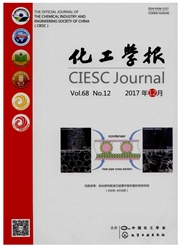

 中文摘要:
中文摘要:
为了研究缺氧条件下游离亚硝酸(FNA)对氨氧化菌(AOB)和亚硝酸盐氧化菌(NOB)的选择性抑菌效应,通过批次试验考察活性污泥经缺氧FNA(0.27 mg HNO-2-N·L-1)处理6 h后,其氨氧化速率与亚硝酸盐氧化速率的变化及AOB和NOB活性恢复情况。结果表明:经缺氧FNA处理的活性污泥,NOB活性下降83.57%,而AOB的活性仅下降22.34%。此污泥在正常条件下运行34个周期后,NOB的活性仍未得到恢复,且硝化过程中亚硝酸盐积累率逐渐增加,最后稳定在90%以上。典型周期内氮化合物浓度变化研究表明,即使在过曝气2 h的条件下,亚硝酸盐积累并未遭到破坏。上述试验结果表明基于缺氧FNA选择性抑菌效应有望稳定实现城市污水短程硝化,为城市污水短程硝化厌氧氨氧化提供基础。
 英文摘要:
英文摘要:
In order to study the selective inhibition effect of free nitrous acid (FNA) (0.27 mg HNO-2-N·L-1) on ammonium oxidizing bacteria (AOB) and nitrite oxidizing bacteria (NOB) under anoxic condition, both the variations of ammonium oxidation rate and nitrite oxidation rate and recovery of AOB reactivity and NOB reactivity were investigated by using the sludge treated by FNA for 6 h under anoxic condition. AOB and NOB reactivities decreased by 83.57% and 22.34% respectively after the sludge was subjected to treatment with FNA. NOB reactivity did not recover when the FNA-treated sludge was used under normal operation environment for 34 cycles. Especially, nitrite accumulation ratio increased gradually and remained over 90%. Moreover, concentrations of nitrogen compounds in the typical cycle showed that nitrite accumulation was not destroyed even if excessive aeration lasted for 2 h. Thus, the selective inhibition effect of FNA under anoxic condition could be used to establish stable nitritation in sewage treatment system, providing the foundation for achieving nitrogen removal from sewagevia nitritation and Anammox.
 同期刊论文项目
同期刊论文项目
 同项目期刊论文
同项目期刊论文
 Complete nitrogen removal from municipal wastewater via partial nitrification by appropriately alter
Complete nitrogen removal from municipal wastewater via partial nitrification by appropriately alter Effect of salinity on N2O production during shortcut biological nitrogen removal from landfill leach
Effect of salinity on N2O production during shortcut biological nitrogen removal from landfill leach Achieving nitritation and phosphorus removal in a continuous-flow anaerobic/oxic reactor through bio
Achieving nitritation and phosphorus removal in a continuous-flow anaerobic/oxic reactor through bio Anaerobic ammonium oxidation in traditional municipalwastewater treatment plants with low-strength a
Anaerobic ammonium oxidation in traditional municipalwastewater treatment plants with low-strength a Effectof salinity on N2O production during shortcut biological nitrogen removal fromlandfill leachat
Effectof salinity on N2O production during shortcut biological nitrogen removal fromlandfill leachat Performanceof anammox UASB reactor treating low strength wastewater under moderate and lowtemperatur
Performanceof anammox UASB reactor treating low strength wastewater under moderate and lowtemperatur Completenitrogen removal from municipal wastewater via partial nitrification byappropriately alterna
Completenitrogen removal from municipal wastewater via partial nitrification byappropriately alterna Achievingnitritation and phosphorus removal in a continuous-flow anaerobic/oxic reactorthrough bio-a
Achievingnitritation and phosphorus removal in a continuous-flow anaerobic/oxic reactorthrough bio-a 期刊信息
期刊信息
